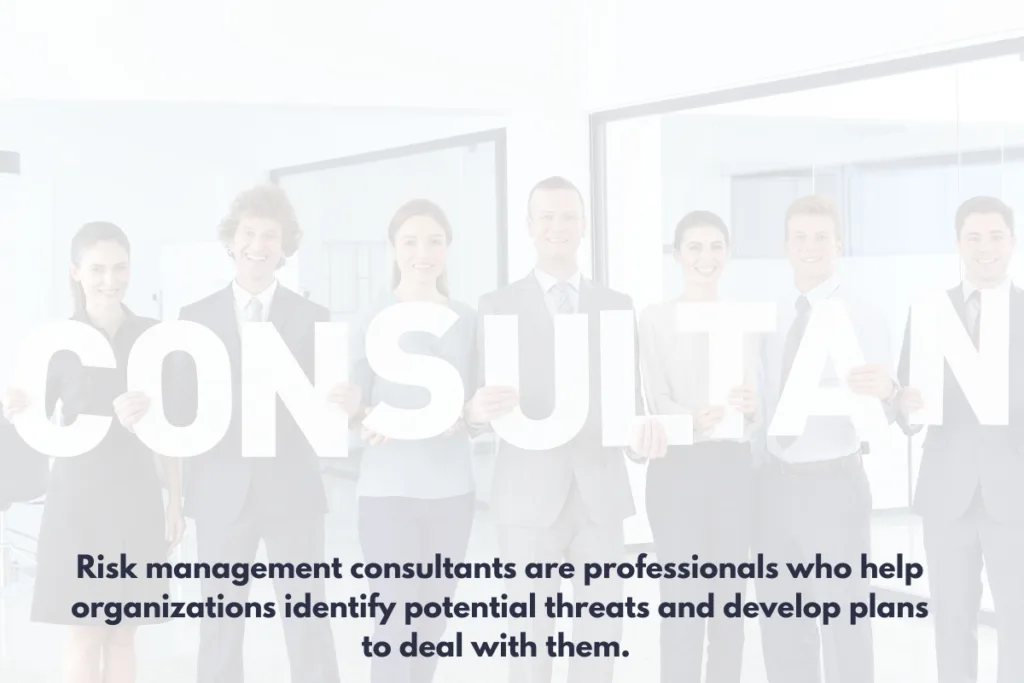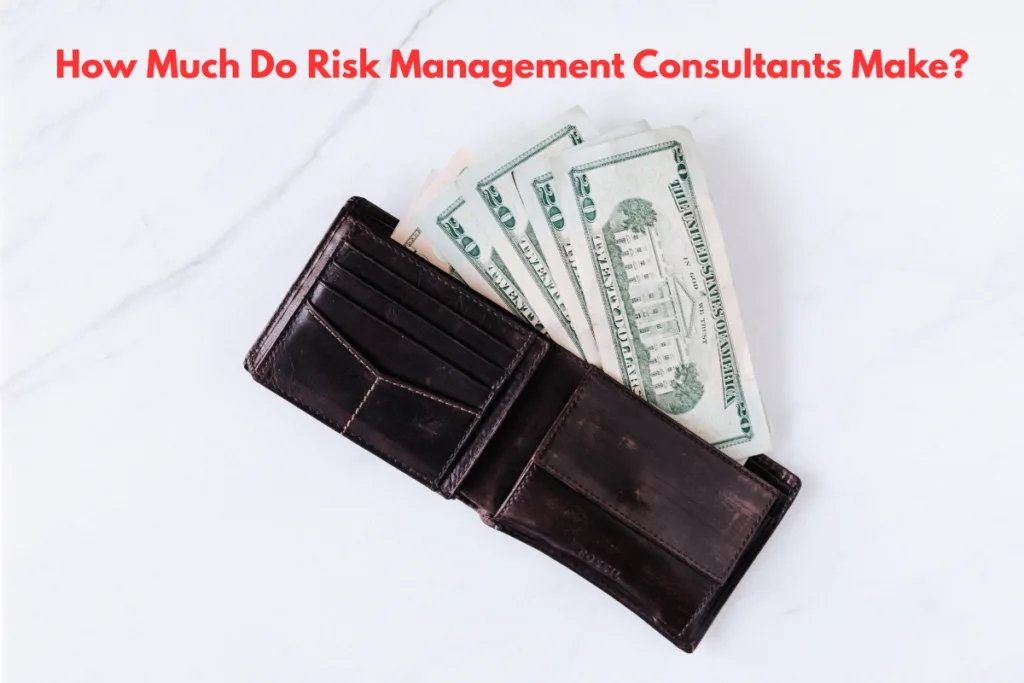Ever wondered who helps companies avoid disaster before it strikes? That’s basically what a risk management consultant does. They’re the people who look at a business and say, “Hey, this could go wrong, and here’s how to prevent it.” Pretty important job, right?
Especially in today’s world, where threats come from everywhere – cyber attacks, natural disasters, reputation issues, you name it. If you’re thinking about a career in this field or maybe your company needs this kind of help, this guide breaks down what risk management consultants actually do, what they earn, and what it takes to become one.
And yeah, it’s pretty good money if you’re wondering!
What Is a Risk Management Consultant?

Risk management consultants are professionals who help organizations identify potential threats and develop plans to deal with them.
They’re basically the people who think about what could go wrong before it actually does. These experts work across all kinds of industries – financial services, healthcare, tech companies, and even security firms like ours at HK Defense. Their whole job revolves around protecting businesses from financial losses, operational problems, security issues, and making sure companies follow regulations.
The thing that makes consultants different from regular risk managers is that they usually work with multiple clients rather than just one company. They bring fresh eyes and specialized knowledge to each situation. They can spot things that people who work at a place every day might miss.
What Does a Risk Management Consultant Do?
So what’s a typical day like for these professionals? Well, there isn’t really a “typical” day – and that’s part of what makes this job interesting. But here are the main responsibilities they handle:
Risk Assessment
First things first – they identify what could possibly go wrong. This means digging into a company’s operations, talking to employees, reviewing documents, and using specialized tools to find potential threats. They look at everything from market fluctuations to physical security vulnerabilities.
Developing Mitigation Strategies
Once they know what could go wrong, they create plans to either prevent those things from happening or minimize the damage if they do happen. This might involve recommending new policies, suggesting technology solutions, or creating emergency response plans like the ones we discuss in our crisis management planning guide.
Implementing Risk Frameworks
Many consultants help organizations set up formal systems for managing risk on an ongoing basis. They might implement frameworks like ISO 31000 or industry-specific standards that give structure to how a company thinks about and handles risks.
Advising Leadership
Risk consultants regularly meet with executives and board members to explain risks in language that makes sense to non-specialists. They need to translate complex analysis into clear recommendations that decision-makers can act on.
Compliance Monitoring
Keeping up with regulations is a huge part of risk management. Consultants help ensure that organizations meet all the legal and regulatory requirements for their industry, which can get pretty complicated depending on the sector.
Creating Business Continuity Plans
What happens if disaster strikes? Risk management consultants develop plans that help companies keep operating even when facing major disruptions. This includes backup systems, emergency procedures, and recovery strategies.
What Does a Risk Management Specialist Do?
People often get confused between consultants and specialists. A risk management specialist typically focuses on a specific type of risk rather than looking at the big picture. They might be experts in cybersecurity risk, financial risk, or operational risk.
Unlike consultants who usually work with multiple clients, specialists often work in-house at a single organization. They’re the go-to experts for their particular domain of risk, diving deeper into one area rather than having the broader view that consultants typically bring. These specialists might work alongside consultants on specific projects or be part of the team that implements the recommendations consultants make.
What Does a Risk Management Analyst Do?
Risk analysts are often the number-crunchers of the risk management world. They gather data, run statistical analyses, create risk reports, and help measure the potential impact of various risks. Many risk management consultants start their careers as analysts, learning the ropes by supporting more experienced professionals.
It’s a good entry point if you’re interested in this field but don’t have tons of experience yet. Analysts focus more on the quantitative aspects – they’re the ones figuring out probabilities and potential financial impacts using models and data analysis tools.
Types of Risks Consultants Address
Risk management consultants deal with a wide range of threats. Here are the main categories they focus on:
Strategic Risks
These are risks related to big-picture business decisions. Like what happens if a new product flops? Or if a competitor comes up with something better? Or if consumer habits suddenly change? Strategic risks can make or break a company’s future.
Operational Risks
These involve the day-to-day running of a business – things like supply chain disruptions, equipment failures, or staffing problems. At HK Defense, we also consider physical security as a critical aspect of operational risk management, including executive protection and facility security.
Financial Risks
This covers everything from cash flow problems to currency fluctuations to investment losses. Financial risks can directly impact a company’s bottom line and ability to operate.
Compliance Risks
Breaking rules is expensive! Compliance risks relate to laws, regulations, industry standards, and internal policies. Consultants help companies navigate the complex world of regulatory requirements.
Security Risks
In today’s world, both physical and cyber security threats are major concerns. Risk consultants assess vulnerabilities in security systems, develop protection strategies, and create response plans for security breaches.
Reputational Risks
A company’s reputation can be damaged in seconds but takes years to rebuild. Consultants help identify potential threats to an organization’s image and develop strategies to protect and repair its reputation when needed.
How Much Do Risk Management Consultants Make?

One of the big questions people have is about the money. How much can you earn in this field?
The answer varies based on experience, location, industry, and certifications, but here’s a general breakdown based on recent salary data for 2025:
Experience Level | Annual Salary Range |
Entry-level (0-2 years) | $68,000 – $90,000 |
Mid-level (3-5 years) | $90,000 – $120,000 |
Senior (6-10 years) | $120,000 – $160,000 |
Principal/Director (10+ years) | $160,000 – $250,000+ |
According to Glassdoor’s 2025 salary data, the average risk management consultant salary in the United States is about $145,000 per year, with top earners making over $250,000 annually.
Location makes a big difference, too. Risk management consultants in financial hubs like New York or centers of tech innovation tend to earn more than those in smaller markets.
The type of firm you work for matters as well. Big consulting firms like Deloitte, KPMG, or specialized risk consultancies often pay more than corporate in-house positions. However, consulting roles usually involve more travel and longer hours.
What Qualifications Do You Need?
Thinking about getting into this field? Here’s what you’ll need:
Education
Most risk management consultants have at least a bachelor’s degree in business, finance, economics, information technology, or a related field. Many senior consultants have master’s degrees, particularly MBAs or specialized risk management programs.
Certifications
Having the right certification can really boost your career prospects and earning potential. Here are some of the most valuable ones:
- Financial Risk Manager (FRM) – Offered by the Global Association of Risk Professionals, this is considered the gold standard for financial risk professionals.
- Professional Risk Manager (PRM) – Provided by the Professional Risk Managers’ International Association, focusing on risk management frameworks and practices.
- Certified in Risk and Information Systems Control (CRISC) – This certification from ISACA is ideal for IT risk professionals.
- Risk Management Professional (RMP) – Offered by the Project Management Institute, focusing on project risk.
Experience
Most employers look for at least 3-5 years of relevant experience in risk, audit, compliance, or a related field. Experience in specific industries can be particularly valuable if you want to specialize.
Skills
Beyond formal qualifications, successful risk management consultants need:
- Strong analytical thinking
- Excellent communication skills
- Knowledge of regulatory environments
- Problem-solving abilities
- Attention to detail
- Project management experience
How to Become a Risk Management Consultant
If this career path sounds interesting, here’s a simplified roadmap to get there:
Step 1: Get the Right Education and Certifications
Start with a relevant degree and add specialized certifications that align with your career goals. The certifications mentioned above can give you a competitive edge.
Step 2: Gain Experience
Build experience in risk-related roles. This might include positions in auditing, compliance, security, or financial analysis. Try to get exposure to different types of risk management scenarios.
Step 3: Specialize and Advance
As you gain experience, you might choose to specialize in a particular industry or type of risk. Many consultants start at consulting firms or in internal risk departments before branching out to independent consulting.
Frequently Asked Questions
What is the difference between a risk consultant and a risk manager?
A risk consultant typically works with multiple clients and brings external expertise, while a risk manager usually works in-house for a single organization. Consultants often handle more varied challenges across different industries, while managers have deeper knowledge of their specific organization.
Do risk management consultants need certification?
Certification isn’t always required, but it definitely helps. Certifications like FRM, PRM, or CRISC demonstrate your expertise and commitment to the field, which can lead to better job opportunities and higher pay.
What industries hire risk management consultants?
Almost every industry needs risk management, but the biggest employers include financial services, healthcare, technology, manufacturing, energy, and government. At HK Defense, we focus on security and risk management for high-net-worth individuals, corporate clients, and organizations with complex security needs.
Is risk management consulting a good career?
With strong demand, competitive salaries, and interesting work challenges, risk management consulting can be an excellent career choice. The field continues to grow as organizations face increasingly complex threats in areas like cybersecurity, climate change, and global supply chains.
Final Thoughts
Risk management consulting offers a challenging, rewarding career path for those who enjoy solving complex problems and helping organizations navigate uncertainty. As businesses face more sophisticated threats and regulatory requirements, demand for qualified risk consultants continues to grow.
At HK Defense Solutions, we provide specialized risk management services that help our clients identify, assess, and mitigate risks before they become problems.
